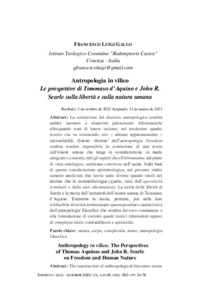Por favor, use este identificador para citar o enlazar este ítem:
https://repositorio.uca.edu.ar/handle/123456789/18062| Título : | Antropologia in vilico: le prospettive di Tommaso d’Aquino e John R. Searle sulla libertà e sulla natura umana Anthropology in vilico: the perspectives of Thomas Aquinas and John R. Searle on freedom and human nature |
Autor : | Gallo, Francesco Luigi | Palabras clave : | ALMA; CUERPO; HOMBRE; ANTROPOLOGIA FILOSOFICA | Fecha de publicación : | 2022 | Editorial : | Pontificia Universidad Católica Argentina. Facultad de Filosofía y Letras | Cita : | Gallo, F. L. Antropologia in vilico: le prospettive di Tommaso d’Aquino e John R. Searle sulla libertà e sulla natura umana [en línea]. Sapientia. 2022, 78 (252). Disponible en: https://repositorio.uca.edu.ar/handle/123456789/18062 | Resumen : | Abstract: La costruzione del discorso antropologico sembra
andare incontro a situazioni palesemente dilemmatiche
allorquando tenti di tenere insieme, nel medesimo quadro
teorico che va costruendo, tesi – almeno apparentemente –
inconciliabili. Questo ‘destino’ dell’antropologia filosofica
sembra rendere impossibile la costruzione di una teoria
sull’essere umano che tenga in considerazione, in modo
integrato e coerente, tutti gli aspetti che effettivamente, dal punto
di vista ontologico, sembrano convivere nell’uomo. Sulla base
di questa considerazione epistemologica, nel presente studio
saranno analizzate due teorie tanto diverse quanto simili nel
destino che le contraddistingue (quello, cioè, dell’aporeticità
terminale e della stasi dilemmatica). La teoria della libertà di
Searle e la teoria dell’unitarietà dell’essere umano di Tommaso
d’Aquino. Entrambe le teorie, pertanto, pur nella loro
irriducibile diversità testimoniano questa peculiare caratteristica
dell’antropologia filosofica che sembra davvero condannata o
alla formulazione di coerenti quadri teorici riduzionisti oppure
di complesse teorie contraddittorie e aporetiche. Abstract: The construction of anthropological discourse seems to encounter blatantly dilemmatic situations when attempting to hold together, within the same theoretical framework being constructed, theses - at least seemingly - irreconcilable. This 'destiny' of philosophical anthropology appears to render impossible the construction of a theory of the human being that takes into consideration, in an integrated and coherent manner, all the aspects that actually, from an ontological point of view, seem to coexist in humans. Based on this epistemological consideration, this study will analyze two theories as different as they are similar in the destiny that distinguishes them (that is, terminal aporeticism and dilemmatic stasis). John Searle's theory of freedom and Thomas Aquinas's theory of the unity of the human being. Both theories, therefore, despite their irreducible diversity, bear witness to this peculiar characteristic of philosophical anthropology that seems truly condemned either to the formulation of coherent reductionist theoretical frameworks or to complex contradictory and aporetic theories. |
URI : | https://repositorio.uca.edu.ar/handle/123456789/18062 | ISSN : | 0036-4703 | Disciplina: | FILOSOFIA | Derechos: | Acceso abierto |
| Aparece en las colecciones: | SAP - 2022 Vol LXXVIII nro. 252 |
Ficheros en este ítem:
| Fichero | Descripción | Tamaño | Formato | |
|---|---|---|---|---|
| antropologia-in-vilico.pdf | 498,84 kB | Adobe PDF |  Visualizar/Abrir |
Este ítem está sujeto a una licencia Creative Commons Licencia Creative Commons

